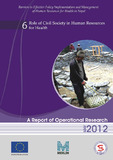Please use this identifier to cite or link to this item:
https://hdl.handle.net/20.500.14356/783| Title: | Role of civil society in human resources for health |
| Other Titles: | Barries to effective policy implementation and management of human resources for health in Nepal |
| Authors: | EUROPEAN UNION MERLIN SOLID/Nepal |
| Citation: | Society for Local Integrated Development Nepal (SOLID Nepal) and Merlin Nepal. Barriers to Effective Policy Implementation and Management of Human Resources for Health in Nepal: Role of Civil Society in Health Resources for Health. Lalitpur, Nepal: SOLID Nepal; 2012 |
| Issue Date: | May-2012 |
| Publisher: | SOLID Nepal |
| Keywords: | Health System Nepal |
| Abstract: | Background: This study “The Role of Civil Society in Human Resources for Health” is one of six research reports on “Barriers to Effective Policy Implementation and Management of Human Resources for Health in Nepal.” The objective of the study is to analyse the role of civil society engagement in enhancing health service delivery in Nepal. Current national health policies and strategies of Nepal illustrate the government’ s commitment to involving Civil Society Organisations (CSOs) in improving Human Resources for Health (HRH) through the decentralisation of health service delivery and the handover of facilities to the Health Facility Operation and Management Committee (HFOMC). However, these have not sufficiently specified CSOs roles. Methodology: A cross-sectional descriptive study was conducted using mixed method with observation checklist. Fifteen districts representing eco-developmental regions of Nepal were selected using multi-stage cluster sampling method. Out of 404 sample, 747 health workforce from 375 health institutions were interviewed (<10% non-response rate) using the Probability Proportionate to Size method as per WHO guideline. Observation was carried out in 256 health facilities. Further, secondary review was carried out for triangulation of findings. Key Findings: Qualitative data indicated a gap on policy implementation, health sector decentralization and CSOs involvement to improve HRH. Nearly 75 percent respondents had opined that the political parties were supporting the health institutions in the grassroots. It was found that the support from the CSO was better in Hill (54.9%) compared to T arai (46.9%) and Mountain (46.7%). The support was significantly different between rural and urban [p <0.05, CI 95%]. Mean Index score of effectiveness of CSOs was found highest in Hills (0.3036) followed by Mountains (0.2669) and T arai (0.2589) [Cronbach's á=0.8057]. While analysing the manifestos of 9 major political parties, only 5 of them have mentioned policy statements on HRH production, distribution and implementation whereas only one party has highlighted strategies with peoples' participation. Conclusion and Recommendations: The government should recognise, reorganise and formalise therole of civil society in policy documents and should seek participation of CSOs in the formulation ofpolicies and strategies related to HRH. The urban based CSOs should be strengthened.The Ayurvedic centres, I/NGOs and Private outlets should be regulated through a guideline to operate in coordination with DPHO so that the roles of CSO in district as a whole could be assessed. The PHCs need to take lead in establishing the coherent relationship with local CSOs, HP and SHP too. Constructive dialogue, planning and mobilisation around the health workforce to broaden the extent of social determinants of health are needed in collaboration with GOs, I/NGOs and private sector should be ensured. Studies and researches related to the involvement of CSO in HRH planning, policy making, managing and implementing the programmes is needed. The district level governance should establish an effective coordination between DDC and DPHO, it should utilise local media and use efforts to enhance the involvement of civil society in health programmes. It should also identify the areas that are unsecured and with low social prestige for HRH within district and periodically counsel the CSOs for making better environment. Most crucially the CSOs should reward better performing HRH and have a social audit of institutions as well as health workers. |
| URI: | http://103.69.126.140:8080/handle/20.500.14356/783 |
| Appears in Collections: | Post Graduate Grant (PG) Reports |
Items in DSpace are protected by copyright, with all rights reserved, unless otherwise indicated.

